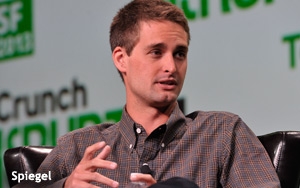How Tech CEOs Talk About Privacy
- by Felicia Greiff , February 4, 2016
 Internet privacy (or lack of privacy) is on everyone's minds -- even tech honchos' minds.
Internet privacy (or lack of privacy) is on everyone's minds -- even tech honchos' minds. This week at the American Magazine Media Conference, Snapchat CEO Evan Spiegel said the following: "There is creepy advertising, and there is advertising that doesn’t know you at all. Our goal is to make a Snapchatter feel understood. And after you understand them, do your best to make an ad relevant to them."
Spiegel has mentioned not wanting Snapchat to creep users out before. At last year's Cannes Lions Festival, he reiterated the sentiment to an audience of mainly brands and agencies, many of whom were probably already skeptical about Snapchat's lack of measurement that could inform ads.
There's clearly more need for tech leaders to make their positions clear about the issues of ad blocking and Internet privacy. A Pew Research Center study posted last month found the words “creepy,” “Big Brother” and “stalking” regularly in answers to a question about customer profiling -- not the most flattering terms.
So in the spirit of total transparency, here's what other tech CEOs have said about privacy, beginning with Steve Jobs. The Apple creator made a pro-user public stance on privacy at the D8 Conference in June 2010: “Privacy means people know what they're signing up for. In plain English, and repeatedly, that's what it means. Ask them. Ask them every time. Make them tell you to stop asking if they get tired of your asking them. Let them know precisely what you're going to do with their data," Jobs said.
Mark Zuckerberg has mostly remained mum on the topic, and when he does, he likes to use the word "control" instead of "privacy." In a Time interview six years ago, he said what people want isn't complete privacy or secrecy, but "control over what they share and what they don't."
In 2009, Google's then-CEO Eric Schmidt uttered the famous line, “If you have something that you don’t want anyone to know, maybe you shouldn’t be doing it in the first place.”
Since then, Alphabet's CEO Larry Page has taken a more PC approach, emphasizing user choice at a 2014 TED conference: "I think the main thing we need to do is just provide people choice. Show them what data’s being collected, their search history, location data."
So how can targeting and consumer privacy strike a balance that everyone likes? It seems that, like all things having to do with marketing, the consumer's wants and needs are at the core. And there are many needs, beginning with understanding who is doing the tracking.
“I have no idea how I’d investigate what info is collected about me in places like Google and Facebook, other than the information I’ve provided them, such as my profile info,” one survey participant said in Pew's study released this year.That person isn't alone; a 2015 Pew study found 37% of respondents felt they have “not much control" over the amount of information collected about them and how it is used.


